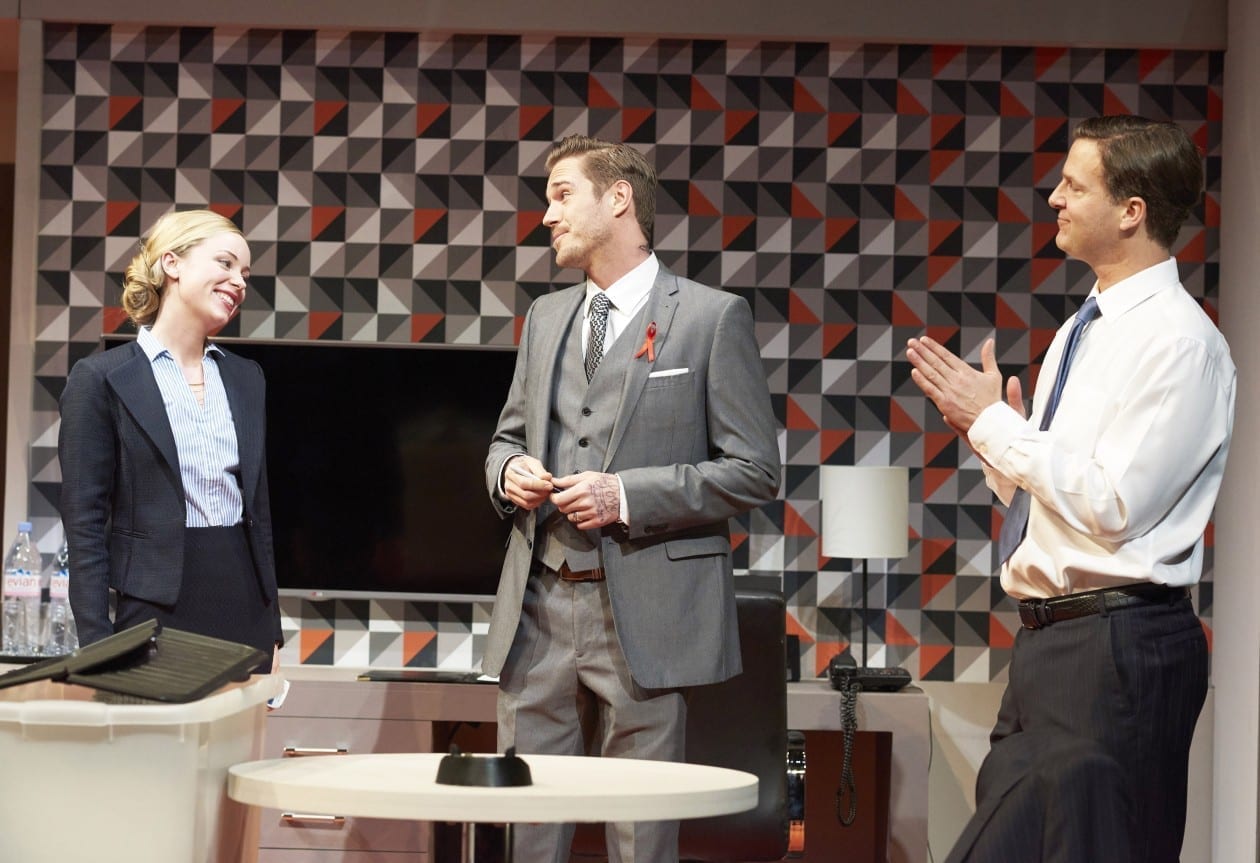In 2010, a footballer, a prince and a Prime Minister met in a Swiss hotel room. Their objective was to win England the chance to host the FIFA World Cup in 2018. William Gaminara’s The Three Lions is a clever satire of what exactly happened when David Beckham, Prince William and David Cameron put their heads together and tried to bring the beautiful game home. Though this play was no theatrical revolution, the three main actors provide hilarious comic performances, and the play comments intelligently on sport, money and power.
As “Football’s Coming Home” booms out into the crowded theatre, the lights dim on a bland looking hotel room and a confused looking David Cameron (Dugald Bruce-Lockhart). He has been given the wrong room, and sends his disastrously ditzy intern, Penny (Antonia Kinlay) to sort out the problem. When Beckham and William arrive, the confusion reaches dizzying heights – flights are delayed, the two Etonians struggle to understand the working class boy, and trousers are, quite literally, lost. As the comedy morphs into farce, three men passionate about the bid – for very different reasons – try to convince greedy, cheating executives that football belongs here, in England. We all know how this story ends; we know how it began. The Three Lions fills us in on the middle, and is typically British in forcing us to laugh at our own failure.
The highlight of the performance was undoubtedly the three lead actors, all of whom inhabited their characters excellently. Bruce-Lockhart’s Cameron was suitably pompous, his forceful, lilting speaking style mimicked excellently. It was almost too accurate. As David Beckham, Séan Browne provided a hilarious contrast: the juxtaposition of these two on stage was incredibly comically effective. A particular highlight was the moment when Browne/Beckham tried, desperately, to work out how old he would be in 2018. Tom Davey (Prince William) was excellent as a marriage of these two characters: the dim Etonian, the goofy Prince as powerful as Cameron, but not much cleverer than Beckham. Bruce-Lockhart, Browne and Davey had brilliant on stage chemistry, and made the best of the witty dialogue provided for them. However, it was not all laughs: Cameron’s and the Prince’s evident (but unspoken) disdain for Beckham’s inarticulacy delivered a subtle, but effective comment on snobbery and class. Whilst the public popularity might lie with the footballer, the real power in this country has stayed in the hands of the upper class.
However, on occasion, the satire strayed a little too far into the territory of caricature, the characters becoming parodies of themselves. I thought this was particularly true of how Beckham was written by Gaminara. Someone as successful as he is (in both the sporting world and as a businessman of sorts) cannot be entirely stupid, though the way he was portrayed contradicted this. His education may not have been as prestigious as Cameron’s or Williams, but having an episode
where he struggled to understand the meaning of “alternative” seemed a little one dimensional. Davey’s William on occasion merely became a practical joker; Bruce-Lockhart was forced to play Cameron as simply a self-important, short-tempered moron. It was at moments like these, when the audience laughed the hardest, that the men on stage became cardboard cut outs rather than characters, and the play lost some of its effectiveness.
The play ends the first act with the idea that “not only do the best team deserve to win, but they have a right to win,” and by the second act this has been cleverly reversed: success (as we now know, from the result of the bid) can be bought with bribery or political pressure Whilst The Three Lions plays it a little too safe to become a theatrical classic, it was an entertaining, amusing watch: recommended.

